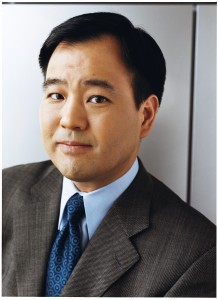This post is part of The Plank Center’s Legacies from Legends in PR Series that was begun in recognition of the 40th Anniversary of the Public Relations Student Society of America in 2007.
Joined IBM from San Jose State University after earning a public relations degree. Named Chief Communications Officer of IBM in 2002, the youngest person to be appointed to a senior executive position since the founder’s son was named Executive Vice President in 1949. Assumed the role of Chief Marketing Officer in 2008, leading marketing, communications and citizenship for the company. Upon his retirement, appointed Executive Fellow at the Yale School of Management. Recipient of the Arthur W. Page Society’s Hall of Fame Award (2009).
When I graduated from San Jose State University in 1984 and started a career in public relations, there were more than 52,000 newspaper reporters in the United States alone. There were zero bloggers, no tweets and not a single Facebook friend.
Today, there are a few thousand fewer U.S. journalists for PR pros to spar with (46,700 at last count). But there are also 112 million blogs, a million tweets a day, and more than 300 million people socializing on Facebook.
Clearly, the ways in which people on planet Earth communicate – and who is doing the communicating – have changed, in fundamental ways. And that is proving massively disruptive to the practice of public relations.
Which is exactly why this is such an exciting time to start your career. You are entering this profession amidst historic change, and that is by far the best time to learn, to innovate and to make a lasting mark.
Think about how the world has changed. Industries, systems, economies and societies have become truly global. Organizations, institutions and communities all must manage myriad stakeholder relationships – with individuals and groups who are far more knowledgeable, independent and empowered than ever before. The tools and media of communication have proliferated – and their cost has dropped near to zero. And at the same time, all actors on this global stage – businesses, governments, nonprofits and individuals – are faced with unprecedented demands for trust and authenticity.
Given that reality, what it means to be a PR professional now is profoundly different from when I started 25 years ago. We used to shape our organizations’ messaging. We used to control the channels of communication. We used to segment audiences and direct different communications to each.
Today, none of those definitions of our work apply. The simple truth is: We are no longer in control. And that’s a good thing, because it both requires and frees us to do different work – work that is far more substantial and meaningful.
Abraham Lincoln once said, “Character is the tree, reputation is the shadow.” I love that idea. And I believe it perfectly describes what our profession must become. Those of you who figure out that our work isn’t just about changing perceptions of the organization, but rather about defining its true character and helping its people live up to that – you will be building this new profession.
In many ways, the slate is blank, and you have the chance to fill it. That’s why this is a great time to be a practitioner in public relations – but only if we apply the tools and tactics that served us well in the past – while developing new ones -to a very different world, for a very different kind of profession, led by a very different kind of professional. I am confident that we will find our way. And you have the opportunity to lead us there.
Published: 2009
More from Jon Iwata: